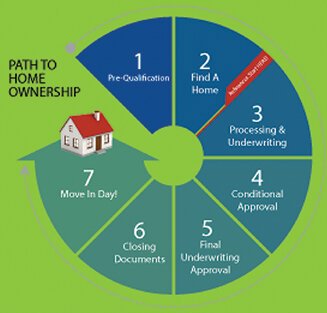
Mortgage Basics
Getting a Mortgage
How Much Cash Do I Need To Buy My Home?
The current real estate market is dynamic and changing constantly, which means mortgage underwriting requirements can change just as quickly. Theresa insists on sharing the most up-to-the-minute information to assist you in making an educated decision about your financial well-being. Three main components determine the amount of money you’ll bring to “closing” when you buy a home:
Down Payment
This is typically a percentage of the purchase price. Down payments start at little or nothing and increase from there, depending on the loan program you choose. There are many options and loan programs and Theresa welcomes the opportunity to explain your choices as well as what you might expect for total costs. Buying a home is one of the most expensive purchases you’re likely to make in your lifetime, so this is the time for questions!
Remember: Other than VA and USDA loans, when your down payment is less than the traditional amount of the purchase price, mortgage insurance may be required. You might pay this monthly, included in your interest rate, in a lump sum at closing or split it both ways, depending on your specific loan requirements.
Closing Costs
Closing Costs are incurred when closing the purchase of the home. Depending on your loan choice, your Realtor can negotiate the closing costs, in full or in part, to be paid by the seller or they will be included as a part of the funds you will need to bring to closing. They normally contain some or all the following and outside the points and processing fees they are all third-party costs:
Points (discount, origination, broker fees, loan fees)
Appraisal fees (appraisal and management company fees and re-inspections)
Credit report fees, Flood determination (it is required that a third party verifies the home’s location in relation to FEMA flood zones)
Tax service fee (a third party that verifies annually that your property taxes are paid so they don’t become a lien against the property)
Processing, underwriting, wire transfer and escrow fees: closing (escrow) fee, courier, government charges and any remote closing fees
Title Insurance (ALTA Extended and Early Issue insurance policies)
Other fees associated with your specific loan program
Be sure to see Shopping for Your Home Loan: HUD’s Settlement Cost Booklet. This booklet covers this information, as well. Theresa also includes this with your loan application package.
Pre-Paids
Pre-Paid items, unlike closing costs, are not fees for services but costs associated with owning a home; a portion of which need to be paid when you close your purchase. They are usually comprised of the following items and will be included as a part of the funds you bring to closing:
Property taxes – for the portion of the property tax year you will own your new home
Homeowners insurance (hazard insurance) – a full year’s premium at closing plus several months’ premiums, depending on the month of your closing
Daily interest (per diem interest) on your new loan for that month. Generally, you then have a month after closing before your first loan payment is due
Impound accounts (aka Escrows or Reserves) for your property taxes and homeowner insurance (this amount is based on the total amounts due for the year and the number of months until they are due to be paid again.)
Keep in mind that your Realtor can help arrange for the seller to pay most, if not all, of these costs through your written offer. This should be carefully considered at the time of your negotiations as it can substantially lower the funds you might need to bring to closing.
Homebuyer Checklist
Keep all copies of your paystubs, bank statements, tax returns and W2s
Make all of your payments on-time
Maintain a stable employment status
Document your assets
Get pre-qualified so you know exactly how much home you can afford
Save money for your down-payment and closing costs
Track and be prepared to provide sources for all large deposits
Talk to your family members about gift funds, if needed
Make sure you’re working with a reputable industry professional you can trust!


